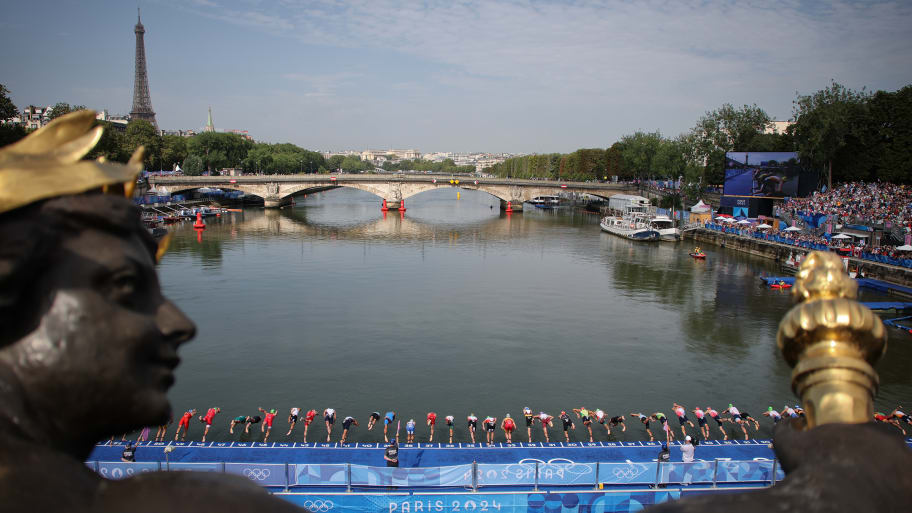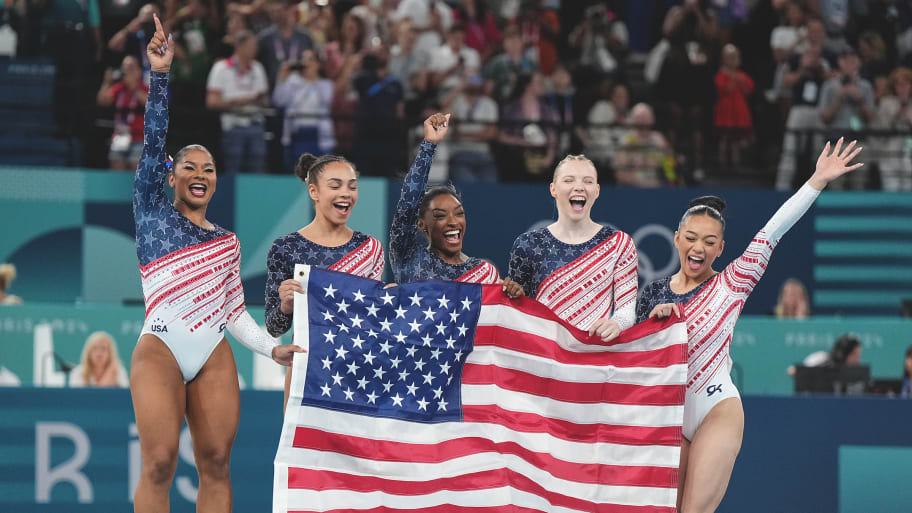
Good morning, I’m Dan Gartland. I hope all the triathletes brought some Pepto Bismol with them to the Olympic Village.
In today’s SI:AM:
🥇 Gold again for U.S. women’s gymnastics
🤔 A “slow pool” in Paris?
🔄 MLB trade deadline wrap-up
Well, they did it
One of the biggest questions entering these Olympic Games was whether organizers’ bold plan to hold the swimming portion of the triathlon in the Seine would backfire. On Wednesday, after months of doubts over the quality of the water in the river, both the men’s and women’s races went off as planned. Mostly.
For background, the decision to use the Seine for the swimming leg of the triathlon—and the open-water marathon swim next week—was one of the most controversial aspects of these Games. If it worked out, it would lead to the spectacular sight of a pack of more than 50 athletes swimming right through the heart of Paris. But there was a big problem: the quality of the water.
The Seine has long been a highly polluted waterway, and getting it Olympics-ready was a difficult and very expensive undertaking. Paris spent $1.5 billion on a variety of projects designed to improve the water quality. That included upgrades to water treatment plants, renovating the city’s 14th-century sewer system and building a catch basin designed to prevent untreated waste from entering the river.
And the project mostly worked. Water quality in the Seine did improve, but it was still highly variable. After heavy rains, the amount of E. coli and Enterococci bacteria in the water would increase. In the months before the Games, the bacteria levels in the river were still too high for safe swimming, but organizers hoped that drier, sunnier summer weather would work in their favor. It didn’t turn out that way.
The heavy rain that viewers saw during the opening ceremony on Friday continued into Saturday and caused bacteria levels to spike. The planned triathlon practice sessions scheduled for Sunday and Monday were canceled due to the water quality and the men’s race, originally scheduled for Tuesday, had to be postponed.
That led to a triathlon doubleheader on Wednesday, with the women going off at 8 a.m. local time as planned and the men following at 10:45 a.m. local time. France’s Cassandre Beaugrand took gold in the women’s race, followed by Switzerland’s Julie Derron in second and Great Britain’s Beth Potter in third. Great Britain’s Alex Yee won the men’s race, with New Zealand’s Hayden Wilde and France’s Léo Bergere taking silver and bronze, respectively.
It was a relief for all the athletes, who had been upset about the possibility that the swimming portion of the race could be scrapped entirely and the event changed to a duathlon. But we’ll wait to see if organizers were right to hold the race as planned.
Paris 2024 and World Triathlon said in a joint statement before the first race that they had been given the go-ahead to proceed after receiving the results of a water quality test at 3:20 a.m. local time. But Paris organizing committee official Aurélie Merle revealed to reporters on Tuesday that the test samples used to determine the water quality are collected nearly 24 hours before the decision is made about whether it is safe to proceed with the swim. Thunderstorms rolled through Paris overnight Tuesday, after the water sample had been collected, so the water the athletes swam in Wednesday morning could have been more polluted than the most recent test results showed.
Beaugrand, the French winner of the women’s race, dismissed concerns about the quality of the water.
“I have no doubts about the quality of the Seine,” she said. “We’ve swum in worse water.”
But that attitude was not shared by all of her colleagues. American Taylor Spivey, who finished 10th in the women’s race, told NBC News that she swallowed “a ton of water.”
“I’ve taken a lot of probiotics over the past month,” she added. “So we’ll see how it goes.”
South Africa’s Jamie Riddle, the 25th-place finisher in the men’s race, left less to the imagination.
“I’m definitely going to be visiting the bathroom later,” he told reporters, according to Reuters. “I swallowed gallons and gallons of water, so that’s gonna be a fun post-race party.”

The best of Sports Illustrated
- The biggest story in Paris on Tuesday was the U.S. women’s gymnastics team’s gold medal win. Michael Rosenberg wrote about how it was a night that was all about Simone Biles.
- Biles’s reign on top of the sport has fundamentally altered U.S. gymnastics, Stephanie Apstein writes.
- Pat Forde investigates whether a “slow pool” in Paris is holding swimmers back.
- American sprinter Noah Lyles is set to become one of the biggest stars of these Olympics when the track and field competition begins next week. Greg Bishop has more on Lyles’s big personality that the world will get to see in Paris.
- Bishop was also at the U.S. women’s rugby team’s historic bronze medal-winning match against Australia.
- Bob Harig’s latest story from Paris is about the controversy over how the Olympic men’s golf field was chosen.
- There are still sports happening back stateside. Albert Breer was at 49ers camp, where the defense really stood out.
- The MLB trade deadline was on Tuesday. Tom Verducci writes that the deals that were made highlight the problems baseball is facing today.
- Jon Wertheim tackled some big Olympics topics in his latest tennis mailbag.
- Egyptian fencer Nada Hafez revealed that she was seven months pregnant when she competed in Paris.
The top five…
… things I saw yesterday:
This article was originally published on www.si.com as SI:AM | Water Quality Concerns Persist Even After Olympic Triathlon.






